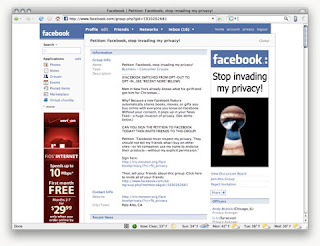Technology is a key driver of digital privacy and is an issue rapidly developing in the online digital environment. Social networks are a great business because users generate the content themselves, which attracts more users and increases the average time spent in those networks. Privacy is defined as "someone’s right to keep their personal matters and relationships secret" ... but surely this is not the case with social networking? This blog talks about how your private information can be invaded by the public and data mining.
So why do people want privacy when they put all their personal information online? Surely it is going to cause implications. I myself do not put personal information online such as where I live or any contact details on Facebook, I think someone who wants to know more about me should just ask and any of my good friends would have that information anyways.
On Facebook users can be segmented according to their age, gender, civil status, place of employment, job title, interests and activities. This brings about the question of how advertisers and marketers and infringement of user privacy? Advertisers are able to target segments by defining their target groups and therefore targeting their advertising to these groups. An interesting read from WARC journals online, which I did not know about myself, stated that:
“Since the average Facebook user has 120 friends, and 61% use Facebook on a daily basis, this would generate more than 75 daily news feeds. To make the user's Home page more manageable, Facebook chooses 20 news feeds based on the profiles and the type of content in which the user is normally most interested” (Mindshare, 2010)
The text extracted from the Journal by Mindshare above shows an example of invasion of privacy in a way that Facebook assumes what the individual user will want to see and so manages the content which appears on their home page. I think you should be able to see what you want to see, even though you can hide news feeds from certain people it is wrong to assume what an individual user will be interested in. Even though this is not a big deal its the principle that Facebook is personal and should it should not interrupt user content.
The Youtube video below on “Click Rain interview on Social Media data mining” shows how marketers want more and more information on consumers. Is this ethical? Mark Henderson on Facebook Rapleaf have documented his information which concerns him. Out of the many other aggregators, Rapleaf has created profiles of over 400’000’000’000 consumers without them knowing and used their information and sold their data to other companies such as banks. I think this is crazy that they are making money from us that we have no idea about- do you think our personal information abused? I certainly do. Their is a search engine called Spokeo where you can locate people’s profiles by typing their name in and see information about them. The more you pay for this search engine, the more information you are able to retrieve. The example of Tyson Plastow shows how he looks up information on himself and how some of it was incorrect like saying he was African-American and he was not.
Privacy in the digital age
Online we might have information about ourselves that might not want the public to see such as Google Earth or Google Street View. This kind of information about our lifestyles and demographics is increasing and being utilised for the benefit of marketers and advertisers. On the plus side people are becoming more informed about privacy on the internet.
Consumers supply a vast amount of data about themselves beyond their laptops such as their mobile phones where people say where they are at a moment in time on whatsap which is a free instant chat messenger available to iPhone owners.
The Chicago Tribune reported that "Advertisers are eager to seize on the popularity of location-based services that allow phone subscribers to map their whereabouts and get localized content”This shows that privacy implications will most probably escalate and consumers have to become more aware of what information they put out there about themselves not only on their laptops and computer screens but on their mobiles as well.
Sniff (2008) is a service which works in conjunction with Facebook. Sniff stands for Social Network Integrated Friend Finder. This piece of software allows networks of people to find each other. It launched in Sweden where it claimed more than 80’000 users as well as Denmark in the UK (2008). Sniff does not need GPS but needs information of consumers locations. This is great for people who want to find friend but what about all those people you can’t trust online? This is where privacy can have huge ethical issues and could put people in potential danger. What do you think of Sniff? Sniff said that they give people control over how their information is dispersed online and that they cannot be located without their consent. Users can also change their settings as to who can locate them, however I personally think this is an invasion of privacy. If you want to know where someone is you can call them can’t you? Why disclose such information online? People are so hungry for the digital world and online communication and it seems to be getting more and more entwined in people’s everyday lives.
So internet users reading this post...think twice before you put up personal information online as you are feeding it to the public!




No comments:
Post a Comment